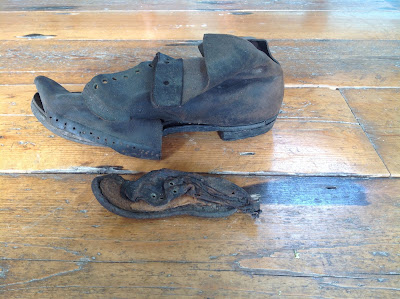Irish Workhouses and Genealogy (Part 1)
In-house
Records
The workhouse system in
Ireland is an often overlooked treasure trove of names, personal histories and
local business names. It takes some time to find this information but it is
well worth the effort.
At the time of their
operation, from 1840 up to the early 1920s, vast quantities of records were
kept by each workhouse. These records were created by The Board of Guardians (the group of men in
each individual Poor Law Union which formed the administrative core of a
workhouse), or the workhouse staff such as the Master, Medical Officer, and Clerks.
The Board of Guardians
This group of men were
very interested with statistics and how their Poor Rate was being spent. To
this end they discussed tenders for workhouse supplies and posts within the workhouse,
salaries of staff and the suggestions of Poor Law Inspectors.
From the minutes of the
Board of Guardian meetings, we have a roll call of the board itself and there
is evidence that the concerns of the rate-payers were not just about their
pockets. We also see concerns about the treatment of workhouse inmates,
education and their diet. For family historians bear in mind that your ancestor
may have been a pauper, but they may also have been an employee of the
bureaucratic machine that was the Poor Law System in Ireland.
Meetings were attended by
both the Guardians themselves and the Workhouse Master and Clerk. Often times the Master would be directed to
discipline staff or dictate what food the paupers would be given. In May 1853
for example, the Clerk of Tuam Workhouse, ‘called attention to the fact that
potatoes were not now used in the soup, the price being excessive and requested
that the Board under the advice of the Medical Officer authorise a change in
the preparation of the soup as an article of diet’.[1]
Like most minutes, these
records include a diverse range of subjects and names. These can include
mention of those evicted from their lands seeking admission, as well as others
already resident in the workhouse brought to the attention of the Board. The
latter group may have been charged with assaulting staff or absconding from the
workhouse school while others are listed among the dead or dying found at the workhouse
door each morning.
The years have not been
kind to these registers and not all workhouses have surviving records. Many that
do survive can be found in local authority archives, particularly the Board of
Guardian Minute Books.
Workhouse Staff
The Master and other
workhouse staff created records such as lists of purchases, provisions needed,
salaries, the names of admitted paupers and pensions. These staff records look more
closely at the day to day operation of the workhouse than those created by the Board. If you are interested in these
records, they exist nowadays in two main forms.
1. The original paperwork.
If the paperwork is extant, it can be located at your Local Authority archive. However, the survival of workhouse records is extremely potted and it should be
noted that Local Authority archive cataloguing is not exhaustive.
2. Contemporary newspaper articles. All
of the above information was of great interest to the public, and featured
regularly in articles. Whichever website you are using to access newspaper articles, an easy way to search is to put in the Poor
Law Union of your choice e.g. ‘Galway Union’.
Once you get to grips with the different records, a whole new source of genealogical information will be open to you. Part two of these articles will look at the types of records generated outside the workhouse walls. Happy searching!
Clare Doyle (In-house archivist and genealogist at The Irish Workhouse Centre)
[1]Galway
County Council Archives, ‘Tuam Poor Law Union (http://gccapps.galwaycoco.ie/ArchivedDocuments/Tuam%20Poor%20Law%20Union,%20GPL5/GPL5%20Tuam%20PLU,%20Descriptive%20List.pdf)
accessed 21 June 2018


Comments
Post a Comment